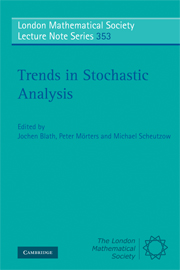Book contents
- Frontmatter
- Contents
- Preface
- Heinrich von Weizsäcker's students
- Heinrich von Weizsäcker's publications
- I Foundations and techniques in stochastic analysis
- 1 Random variables – without basic space
- 2 Chaining techniques and their application to stochastic flows
- 3 Ergodic properties of a class of non-Markovian processes
- 4 Why study multifractal spectra?
- II Construction, simulation, discretization of stochastic processes
- III Stochastic analysis in mathematical physics
- IV Stochastic analysis in mathematical biology
1 - Random variables – without basic space
Published online by Cambridge University Press: 05 March 2012
- Frontmatter
- Contents
- Preface
- Heinrich von Weizsäcker's students
- Heinrich von Weizsäcker's publications
- I Foundations and techniques in stochastic analysis
- 1 Random variables – without basic space
- 2 Chaining techniques and their application to stochastic flows
- 3 Ergodic properties of a class of non-Markovian processes
- 4 Why study multifractal spectra?
- II Construction, simulation, discretization of stochastic processes
- III Stochastic analysis in mathematical physics
- IV Stochastic analysis in mathematical biology
Summary
Abstract
The common definition of a random variable as a measurable function works well ‘in practice’, but has conceptual shortcomings, as was pointed out by several authors. Here we treat random variables not as derived quantities but as mathematical objects, whose basic properties are given by intuitive axioms. This requires that their target spaces fulfil a minimal regularity condition saying that the diagonal in the product space is measurable. From the axioms we deduce the basic properties of random variables and events.
Introduction
In this paper we define the concept of a stochastic ensemble. It is our intention thereby to give an intuitive axiomatic approach to the concept of a random variable. The primary ingredient is a sufficiently rich collection of random variables (with ‘good’ target spaces). The set of observable events will be derived from it.
Among the notions of probability it is the random variable which in our view constitutes the fundamental object of modern probability theory. Albeit in the history of mathematical probability events came first, random variables are closer to the roots of understanding nondeterministic phenomena. Nowadays events typically refer to random variables and are no longer studied for their own sake, and for distributions the situation is not much different. Moreover, random variables turn out to be flexible mathematical objects. They can be handled in other ways than events or distributions (think of couplings), and these ways often conform to intuition.
- Type
- Chapter
- Information
- Trends in Stochastic Analysis , pp. 13 - 34Publisher: Cambridge University PressPrint publication year: 2009

